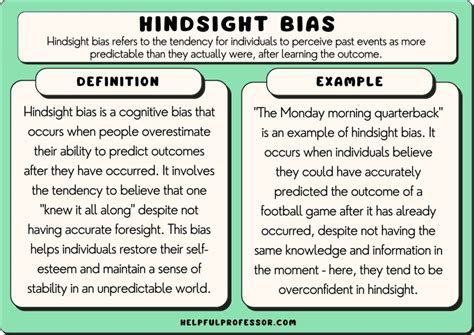In hindsight, everything seems obvious. We see the mistakes we made, the decisions we should have made, and the outcomes we could have avoided. Hindsight bias is the tendency to overestimate our ability to have predicted an event after it has already happened.

Hindsight bias is a cognitive bias that affects us all. It can lead us to make bad decisions, because we believe we know more than we actually do. It can also make us feel bad about ourselves, because we think we should have been able to predict and prevent negative events.
How Hindsight Bias Works
Hindsight bias works in a number of ways:
- We tend to remember the information that is relevant to the outcome of an event, and we forget the information that is not. This makes it seem like we could have predicted the outcome, even though we could not have known all of the relevant information at the time.
- We tend to downplay the role of chance and luck in events. We like to believe that we are in control of our lives, and that we can predict the future. This makes it difficult for us to accept that sometimes things happen for no reason.
- We tend to be more confident in our predictions after an event has happened. This is because we have the benefit of knowing the outcome, which makes it easier to see how things could have turned out differently.
Why Hindsight Bias Matters
Hindsight bias can have a number of negative consequences:
- It can lead us to make bad decisions. Because we believe we know more than we actually do, we may make decisions that are based on faulty information. This can lead to poor outcomes, both for ourselves and for others.
- It can make us feel bad about ourselves. When we look back on our past mistakes, we may feel like we should have been able to predict and prevent them. This can lead to feelings of guilt, shame, and regret.
- It can make it difficult to learn from our mistakes. If we believe that we could have predicted an event, we may be less likely to examine our own behavior and identify the mistakes we made. This can make it difficult to learn from our experiences and improve our decision-making skills.
How to Overcome Hindsight Bias
There are a number of things we can do to overcome hindsight bias:
- Be aware of the bias. The first step to overcoming hindsight bias is to be aware of it. When you are making a decision, keep in mind that you may be overestimating your ability to predict the future.
- Consider all of the available information. When you are making a decision, make sure to consider all of the available information, both the information that is relevant to the outcome of the event and the information that is not.
- Be open to the possibility of chance and luck. Sometimes things happen for no reason. Be open to the possibility that you may not have been able to predict an event, even if it seems obvious in hindsight.
- Don’t dwell on your mistakes. If you make a mistake, don’t dwell on it. Learn from your mistake and move on.
Tips for Avoiding Hindsight Bias
Here are a few tips for avoiding hindsight bias:
- Write down your predictions before an event happens. This will help you to see how well you are actually able to predict the future.
- Talk to other people about their predictions. This can help you to see different perspectives and to identify potential biases in your own thinking.
- Be willing to change your mind. If you learn new information, be willing to change your mind about your predictions.
Conclusion
Hindsight bias is a cognitive bias that affects us all. It can lead us to make bad decisions, because we believe we know more than we actually do. It can also make us feel bad about ourselves, because we think we should have been able to predict and prevent negative events. However, there are a number of things we can do to overcome hindsight bias and make better decisions.
